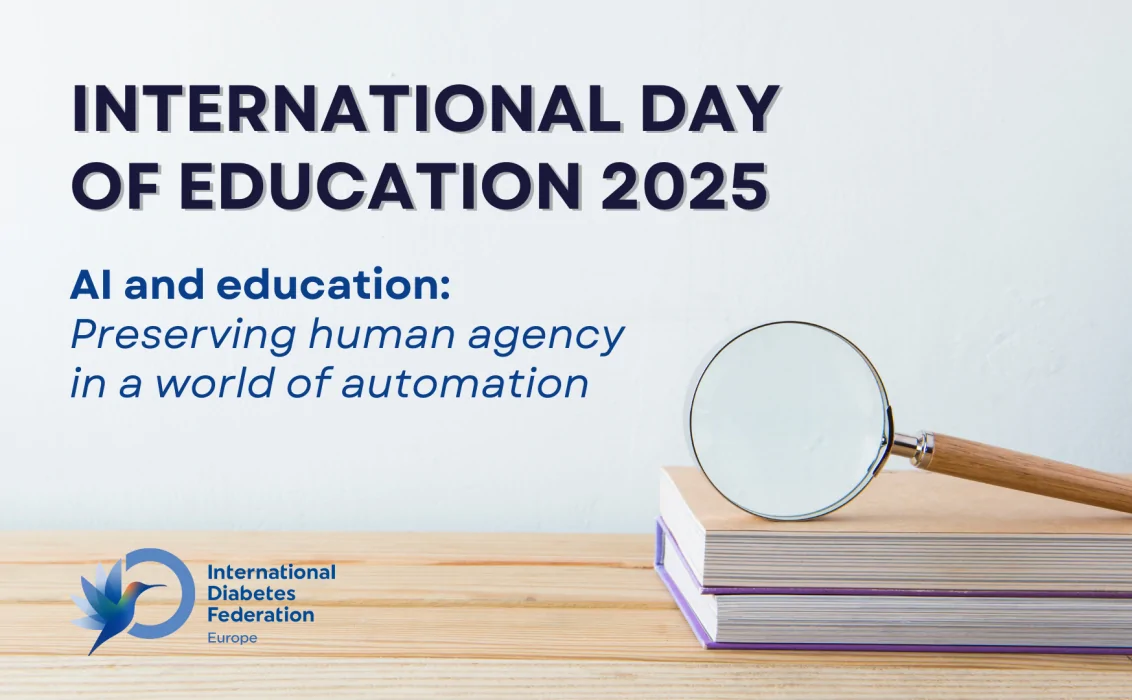January 24 marks the International Day of Education. This year, the day focuses on Artificial Intelligence (AI) with the aim to inspire reflections on how AI interacts with education in shaping societies. Through education, individuals and communities can be equipped to navigate, understand and guide this technological advancement in a way that makes it an asset for stronger societies rather than a challenge. The notion of human agency is crucial in understanding how AI can complement human decision-making without replacing it.
AI has been defined in various ways, but fundamentally, it refers to a system that uses advanced algorithms to make inferences and decisions based on large data sets [1].
AI applications in health
AI has made significant strides across all fields, particularly in healthcare. It is transforming the organisation and delivery of care through applications such as medical imaging, diagnostics, virtual patient care, research and patient engagement [2]. AI applications in diabetes and other chronic conditions are particularly valuable because of the extensive long-term data generated from medical records, lab results and self-management tools. By analysing this data, AI can help identify risk factors, optimise prevention strategies, help establish personalised care pathways and alleviate the burden of self-management [3]. Some AI tools such as continuous glucose monitors (CGMs), automated insulin delivery systems and risk prediction models are already in use in the field of diabetes and help people manage their condition while reducing workload and burden for both people living with diabetes (PwD) and healthcare professionals (HCPs).
The COVID-19 pandemic highlighted the vulnerability of health systems, particularly in managing chronic conditions. Leveraging AI-driven solutions can also support the digitalisation of health systems, strengthening their preparedness and resilience in addressing today’s complex healthcare challenges. This transformation can be made possible by AI’s ability to predict outcomes and enable proactive, data-driven decision-making. However, challenges remain, along with important considerations to ensure that AI-driven solutions in healthcare are used effectively to improve health outcomes and quality of life, rather than exacerbate inequalities in access to care. Education plays a key role in empowering both HCPs and PwD to use AI tools effectively and in ways that meet their needs and goals.
AI in diabetes prevention and early detection
Diabetes, like many other non-communicable diseases (NCDs), results from a complex interplay of risk factors, including individual health factors (e.g., genetics) and external health factors like social, commercial, economic and environmental determinants. Prevention is crucial in reducing NCD prevalence and avoiding and delaying the onset and progression of their complications. AI is a powerful tool for identifying risk factors early, especially in conditions like Type 2 diabetes (T2D) where early signs often go unnoticed until complications develop [4]. By analysing vast datasets including individuals’ health status and predispositions, AI can predict health risks before symptoms emerge, enabling timely and targeted interventions for individuals in at-risk groups. For example, AI-driven risk prediction models can identify individuals likely to develop T2D, even years before symptoms arise, enabling early preventive measures like lifestyle coaching or dietary interventions. Virtual coaching platforms powered by AI are already helping high-risk individuals adopt healthier habits through tailored exercise and nutrition plans.
Population health management can therefore significantly benefit from AI by integrating diverse data sources, such as genetics, lifestyle and environmental factors. For example, the National Health Service (NHS) in England is launching a world-first trial for an AI tool designed to predict T2D risk up to 13 years before it develops, enabling early, non-invasive interventions [5].
With one third of PwD undiagnosed and many already showing complications such as cardiovascular diseases (CVD) at diagnosis, early and accurate detection is critical.
AI in diabetes care
Optimal diabetes care requires integration and personalisation. This involves the delivery of high-quality services across the life course, tailored to the multidimensional needs of each PwD and provided by a coordinated, multidisciplinary team. General practitioners, endocrinologists, diabetes specialist nurses, educators, dietitians, psychologists and other specialists all play critical roles in this process.
Integrated, personalised care places PwD at the centre, focusing on their needs and preferences to achieve optimal health outcomes. As diabetes is a lifelong condition, support, services and resources must adapt across the life course, from paediatric through to adult and geriatric care. Personalised care pathways should be tailored to each PwD, adjusting to their changing circumstances and coordinating care across providers and levels. However, challenges such as workforce shortages, time constraints and a lack of decision-support tools can prevent the delivery of effective integrated and personalised care.
AI can help address these issues in various ways:
- Supporting care personalisation: AI can leverage data from various sources such as diabetes registries, electronic health records, CGMs and apps to uncover patterns, anticipate needs and predict outcomes. AI-powered clinical decision support tools can use this information to help HCPs identify appropriate treatments, tailor care pathways and make adjustments as needed, ultimately supporting PwD to achieve their health goals and reduce the risk of complications.
- Improving interactions between PwD and HCPs: digital tools and diabetes management systems incorporating an AI component can support PwD engagement and empowerment and improve their interactions with HCPs. For example, AI platforms can analyse PwD data and provide self-management recommendations that complement in-person consultations. By leveraging AI insights, HCPs can also optimise consultation time and have more productive discussions on evaluating, and if needed adjusting, PwD’s diabetes management plans. For example, virtual coaching platforms powered by AI are used to deliver self-management advice based on real-time data, enabling PwD to take proactive steps between consultations while providing insights that HCPs can use during appointments.
- Screening for complications: PwD are at risk of complications such as CVD, kidney disease and diabetic retinopathy. AI tools can analyse data from sources such as electronic health records to help HCPs identify at-risk individuals and enable timely interventions to lower the risk or slow down the progression of complications. AI is also improving screening efficiency for diabetes-related complications, as seen with AI retinal screening systems that automatically detect diabetic retinopathy from eye images, without requiring evaluation by an ophthalmologist. By integrating these tools into primary care, early diagnosis and referrals can be made more accessible, especially for PwD in rural or underserved areas.
- Accelerating research and personalised therapeutics: AI also has a key role to play in diabetes research and therapy because of its ability to analyse the large and complex datasets used in medical research. By examining genetic, clinical and lifestyle data, AI identifies biological vulnerabilities in individuals and subpopulations, enabling the creation of tailored therapies. For instance, AI-driven drug discovery platforms can design medications targeting specific metabolic pathways, optimise clinical trials and identify potential drug repurposing
AI in diabetes self-management
Diabetes is a complex condition that requires 24/7 self-management, with constant decisions about medication, diet and physical activity. The combination of wearable devices, AI-powered analytics and digital therapeutics can significantly support PwD by helping them make informed decisions about nutrition, exercise and medication. Not only does this improve blood glucose management and lower the risk of developing complications but it also reduces the burden of decision-making, improving quality of life.
- Self-management education: Empowering PwD through self-management education is crucial for achieving optimal health outcomes aligned with their lifestyle and needs. However, access to such education can be limited and often standardised. AI-powered digital tools offer personalised education by analysing PwD data and preferences and providing tailored insights on how to integrate diabetes management into their daily life, from carbohydrate counting to stress management techniques.
- AI-powered decision-support tools: Wearable devices such as CGMs and smartwatches, alongside mobile apps, collect real-time data on blood glucose, activity, sleep, diet and more. AI-driven platforms analyse this data to provide personalised recommendations, such as customised nutrition plans, blood glucose predictions and optimised medication schedules. Additionally, digital therapeutics with AI algorithms provide real-time reminders and interventions to support easier decision-making and diabetes management.
- Automated insulin delivery systems: AI and machine learning (ML) – a subset of AI using statistical techniques to learn and adapt from data – are revolutionising automated insulin delivery (AID) systems by integrating CGMs, insulin pumps and advanced algorithms. These systems analyse real-time glucose data to adjust insulin delivery, predicting trends based on variables like meals, activity, sleep and stress. AID systems improve glycaemic control with minimal user input, easing the burden of constant diabetes management. Future AI and ML advancements are expected to further improve AID systems by integrating additional data sources, such as meal-tracking apps or wearable fitness devices, ultimately creating more personalised and hands-free solutions for diabetes management, improving quality of life for PwD.
Challenges in the use of AI in healthcare and diabetes care
Despite its transformative potential, the adoption of AI in healthcare, including diabetes care, faces several challenges that must be addressed to fully harness its benefits. These are not merely technical or systemic but deeply connected to the well-being and trust of individuals whose health is at stake. For individuals, the way their health data is used directly affects their care, health outcomes and quality of life. They rely on AI to make accurate predictions, support clinical decisions and enable personalised treatments in a way that is relevant for their desired health outcomes. However, achieving this requires addressing barriers related to regulations, ethics, infrastructure and economics, while ensuring that AI systems are able to prioritise individuals’ needs and rights at every step.
- Ethics & data privacy: The ethical use of AI in healthcare revolves around ensuring that sensitive health data is used responsibly. Individuals need assurance that their privacy will be respected, their data will not be misused and that decisions affecting their health are made transparently and fairly. Many AI systems function as “black boxes”, making it difficult to explain how decisions are made – a significant concern when such decisions influence individuals’ treatment or care, and thus their health. Ethical risks also arise if AI systems reduce human autonomy by making choices that restrict individuals’ freedom or access to certain treatments based on algorithmic predictions. Human oversight is therefore essential to ensure that AI supports, rather than replaces, HCPs decision-making, and always prioritises individuals’ right to informed and independent choice.
- Data infrastructure: Another key barrier is the need for large, high-quality datasets. AI relies on vast amounts of data to deliver accurate predictions and insights, but healthcare data is often fragmented, poorly standardised or incomplete, limiting its potential. For example, according to research by IDF Europe, only nine European countries currently have comprehensive diabetes registries covering all age groups and diabetes types. Effective data management systems are required to ensure data quality and usability. Integrating AI into clinical workflows and electronic health records also demands robust infrastructure and significant updates to existing healthcare IT systems. Additionally, AI systems should overcome issues like algorithmic bias, which can result from skewed or non-representative datasets, leading to inequitable outcomes. Clear accountability mechanisms are needed when AI systems influence treatment decisions to ensure responsibility for errors or adverse outcomes.
- Economic considerations: Developing, deploying, and maintaining AI systems in healthcare is costly. High upfront costs, coupled with uncertainties about return on investment, often deter healthcare organisations from adopting these technologies. Yet, for patients, these delays mean postponed access to innovations that could significantly improve care and outcomes.
- Regulatory frameworks: Efficient and forward-thinking health technology assessment (HTA), for example, is critical in promoting the adoption of digital health tools incorporating AI components. By rigorously evaluating AI solutions and keeping individuals’ rights and interests at the centre, HTA can ensure that funding is directed toward technologies most capable of improving care and people’s lives. Robust and harmonised health technology assessment frameworks are, however, still lacking while many HTA bodies may, as yet, lack the resources and/or knowledge to provide at scale.
“Technology is supposed to improve the lives of PwD and the work of HCPs. However, there are many risks related to quality, ethics, privacy and the sensitivity of health information. Introducing these innovations presents a major challenge, and I hope the European Union can support all countries in addressing this issue. There is much work to be done. For healthcare systems to provide quality care, robust data is crucial. However, managing the vast amounts of data effectively is a challenge due to limited human resources.” – Dr. Pilar Aparicio Azcárraga, Policymaker form Spain
The role of education in empowering PwD and HCPs in AI adoption
The successful integration of AI into diabetes care relies on the readiness of both HCPs and PwD to engage with, and effectively use, these systems. For HCPs, few are, as yet, trained in the use of AI and may feel hesitant to incorporate it into clinical decision-making. Education plays a critical role in bridging this gap, ensuring that HCPs are equipped with the necessary knowledge to use AI tools effectively and accurately interpret their outputs. Training programmes tailored to HCPs should emphasise how AI can support, rather than replace, their clinical expertise.
“HCPs should learn about available apps and other digital tools to better understand how they could help PwD. They should be seen as a resource. Technology is going to change our roles, how we interact and what we do, but it cannot replace some human tasks. Hopefully, it will be able to help with challenges such as resource allocation, timing and staffing. Interoperability is essential and data should be patient-owned to foster trust among users.” – Dr. Sufyan Hussain, Endocrinologist from the UK
Similarly, education is essential for empowering PwD to utilise AI effectively for managing their diabetes. AI tools can alleviate much of the burden associated with diabetes care by personalising treatment and management, but PwD must understand how to use these tools to maximise their potential. Diabetes education should include modules to train PwD on how to interact with AI-driven tools to receive support that reflects their individual needs, preferences and circumstances as well as desired health outcomes. This level of engagement ensures that AI tools provide tailored recommendations that are person-centred, empowering PwD to make informed decisions about their own health.
To maximise the effectiveness of AI in diabetes care, it is also crucial to involve PwD throughout the development process of these tools. Their input ensures that AI-driven solutions are inclusive, relevant and avoid perpetuating existing biases or inequalities in access to care and health outcomes. By actively incorporating PwD’s lived experiences, the design and implementation of AI solutions can better meet their real-world needs, fostering a sense of ownership and trust in the technology.
Our call to action
AI has the potential to revolutionise diabetes care, by improving health system resilience, personalising prevention and care and improving health outcomes.
We call on all policymakers to help realise this potential and support efforts to scale up the adoption of AI-driven solutions in a way that remains centred around people. This means developing policies supporting inclusive design and implementation processes as well as robust regulatory frameworks ensuring fairness, transparency and accountability.
This also means supporting policies that empower individuals through education, and leverage AI as a tool that complements human expertise and decision-making, fostering a future where technology truly improves care and quality of life.



